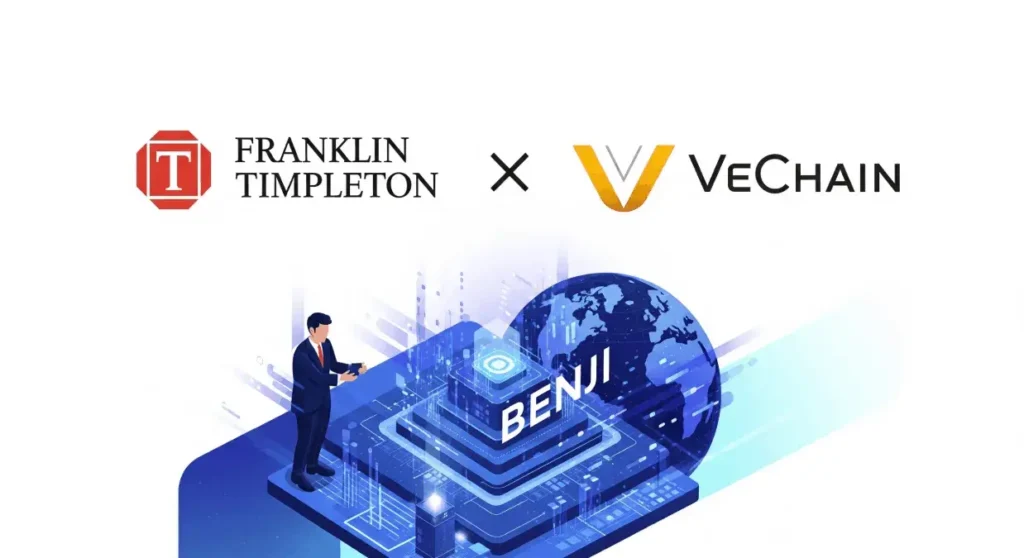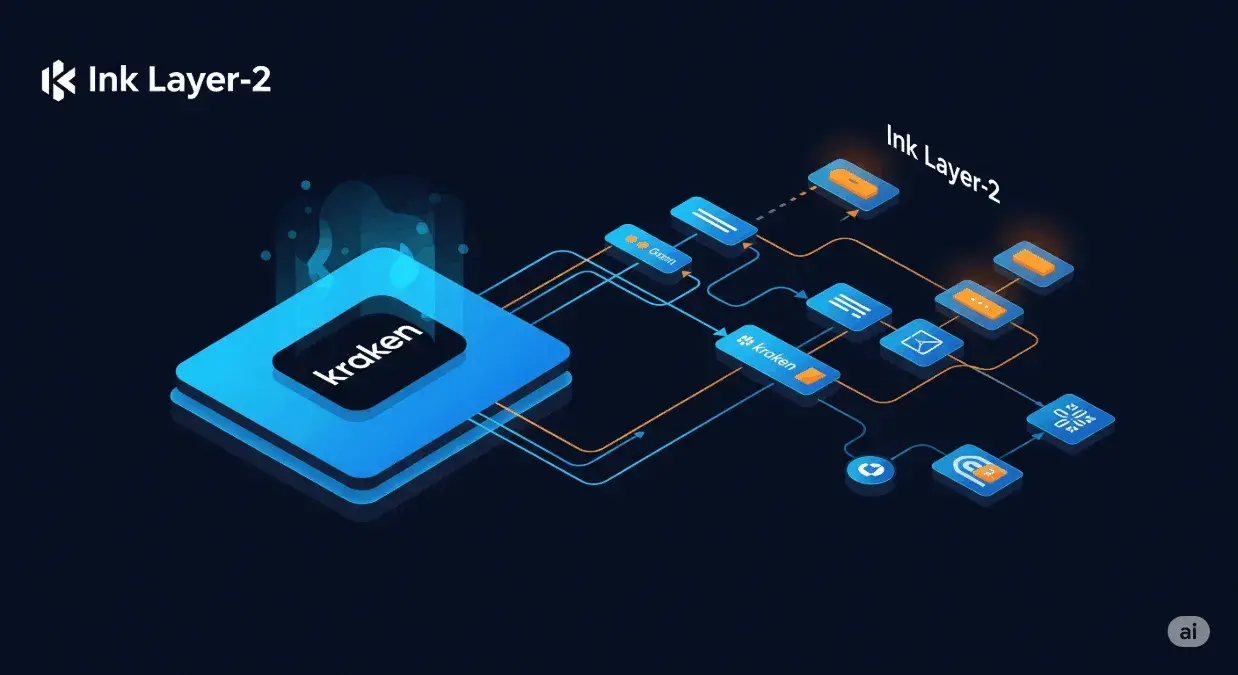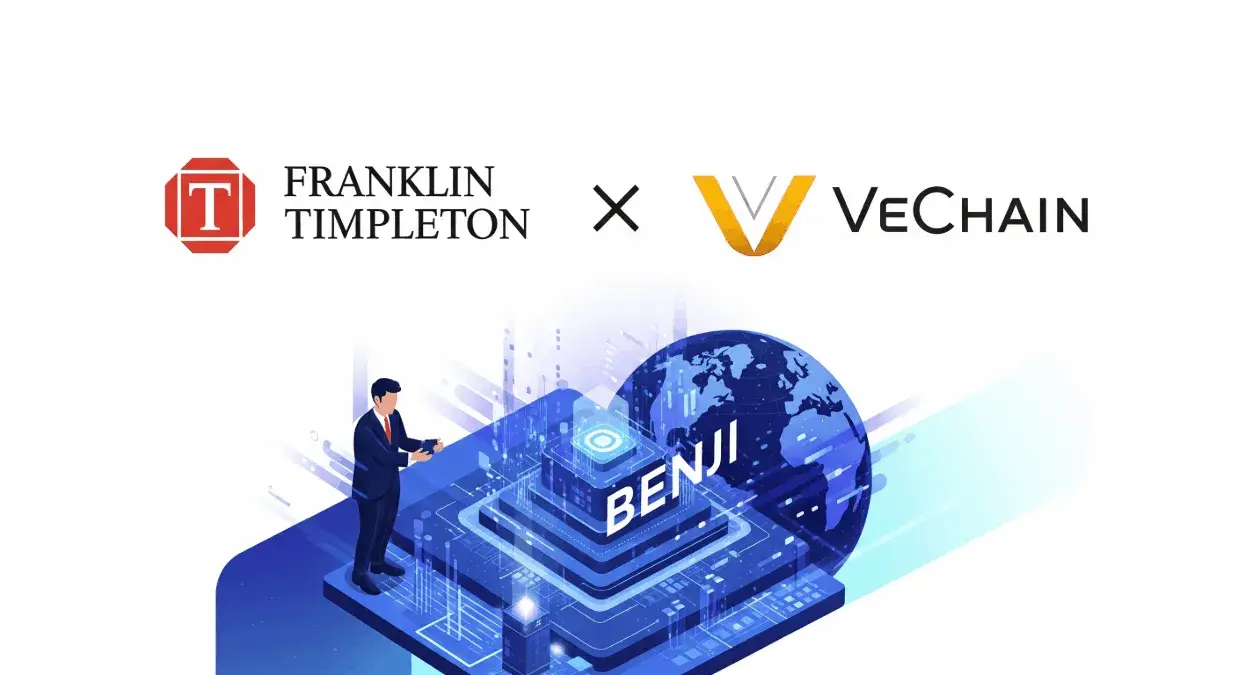Franklin Templeton Taps VeChain: Expanding Reach for Regulated Tokenized Fund BENJI

In a significant move that underscores the growing convergence of traditional finance and the blockchain ecosystem, Franklin Templeton, a global investment management organization, is set to integrate its tokenized fund, the Franklin OnChain U.S. Government Money Fund (FOBXX), into the VeChain network. This strategic expansion aims to broaden the fund’s accessibility within the burgeoning crypto landscape and further democratize access to regulated financial products.
The FOBXX fund, which has been operating on the Stellar blockchain since its inception in 2021, is already tokenized as BENJI. This pioneering digital asset provides users with a direct investment avenue into the U.S. Government Money Fund, bypassing traditional intermediaries, provided they adhere to necessary Know Your Customer (KYC) requirements. The new integration will make BENJI accessible on VeChain through SafeBridge, a specialized protocol developed by SafeTech Labs, designed to securely and traceably transfer assets between disparate public blockchains.
Why VeChain? A Strategic Choice for Corporate Integration
The decision to onboard FOBXX onto the VeChain network is a testament to VeChain’s unique value proposition within the blockchain space. Franklin Templeton specifically selected VeChain for several compelling reasons:
- Corporate-Oriented Approach and Partnerships: VeChain has a strong track record of forging partnerships with traditional companies and focusing on enterprise-grade blockchain solutions. This aligns perfectly with the regulated nature of FOBXX and Franklin Templeton’s commitment to institutional standards. Recent reports indicate collaborations with major players like BitGo and Keyrock, further cementing VeChain’s enterprise appeal.
- Low Energy Consumption and Reduced Fees: VeChain’s dual-token model (VET and VTHO) ensures predictable and low transaction costs, which is crucial for a money market fund where cost efficiency is paramount. Additionally, its Proof of Authority (PoA) consensus mechanism makes it one of the most energy-efficient blockchains, consuming significantly less energy than networks like Bitcoin.
- Focus on Tokenized Traditional Assets: VeChain’s infrastructure and strategic direction are well-suited for the tokenization of real-world assets (RWAs). This integration will make the FOBXX fund available to both institutional and retail users on a network that is actively positioning itself as a more accessible and cost-effective option for integrating traditional financial instruments onto the blockchain.
The Franklin OnChain U.S. Government Money Fund (FOBXX) is a substantial fund, managing over $740 million in assets as of June 30, 2025 (though the provided text initially stated $3.6 billion, recent data indicates a more current figure of approximately $743.8 million). It primarily invests in U.S. Treasury bonds, repurchase agreements, and other short-term debt instruments. Crucially, it is registered with the U.S. Securities and Exchange Commission (SEC) as a regulated investment, providing a layer of trust and compliance that is highly sought after in the digital asset space.
An Expansion, Not a Migration: Broadening Access and Efficiency
This integration with VeChain represents an expansion of BENJI’s accessibility rather than a full migration from Stellar. It underscores Franklin Templeton’s multi-chain strategy to broaden the ways users can interact with the fund and to reach a wider audience on more cost-effective blockchain networks. The fund’s underlying structure and management remain firmly under the control of Franklin Templeton, ensuring continuity and regulatory adherence.
The Role of SafeBridge and Traceability
SafeTech Labs’ SafeBridge protocol is pivotal to this integration. It acts as the secure conduit connecting the Stellar and VeChain blockchains, ensuring that BENJI tokens maintain equivalence and traceability across both networks. This cross-chain solution is critical for maintaining the integrity and fluidity of the tokenized asset, allowing seamless transfer and interaction for investors. SafeBridge’s design emphasizes traceability, which is a key requirement for regulated financial products operating on public blockchains.
The tokenized version of FOBXX, BENJI, stands out as one of the few regulated funds currently operating on public blockchains. By leveraging blockchain technology for record-keeping and transaction activity, Franklin Templeton aims to harness the efficiencies of distributed ledger technology to streamline operations and reduce costs associated with traditional fund management. This also empowers users to invest directly, removing layers of intermediaries that typically add complexity and expense.
The Broader Impact of Tokenized Funds on Public Blockchains
The move by Franklin Templeton to expand BENJI’s presence highlights a significant trend in the financial industry: the tokenization of real-world assets. This process converts rights to real-world assets into digital tokens on a blockchain, offering several benefits:
- Increased Liquidity: Tokenization can enhance the liquidity of traditionally illiquid assets by enabling fractional ownership and easier transferability on global digital markets.
- Enhanced Accessibility: It lowers the barriers to entry for investors, allowing both institutional and retail users to access investment opportunities that might otherwise be out of reach due to high minimums or complex processes.
- Greater Transparency: Blockchain’s immutable ledger provides a transparent record of ownership and transactions, reducing fraud risks and increasing trust among participants.
- Operational Efficiencies and Cost Reduction: Automating processes through smart contracts and reducing the need for intermediaries can lead to significant cost savings and faster settlement times.
The integration of a regulated fund like FOBXX onto public blockchains like Stellar and now VeChain demonstrates the growing confidence in blockchain technology to handle sophisticated financial products in a compliant and secure manner. This trend is likely to continue as more financial institutions explore the advantages of tokenization and as regulatory frameworks evolve to support these innovations. The emphasis on KYC requirements for BENJI ensures that despite operating on public blockchains, the fund adheres to anti-money laundering and counter-terrorist financing regulations, crucial for maintaining its regulated status.
Stay informed, read the latest crypto news in real time!
Conclusion: A Leap Forward for Digital Finance
Franklin Templeton’s decision to add its FOBXX fund to the VeChain network via SafeBridge is more than just a technological integration; it’s a strategic embrace of blockchain’s potential to redefine financial services. By expanding the reach of its regulated BENJI token, Franklin Templeton is not only making U.S. Government Money Fund investments more accessible and efficient but also validating VeChain’s capabilities as a robust, enterprise-grade blockchain for traditional finance. This collaboration marks a significant leap forward in bridging the gap between conventional investment vehicles and the burgeoning world of digital assets, paving the way for a more inclusive and technologically advanced financial future.




